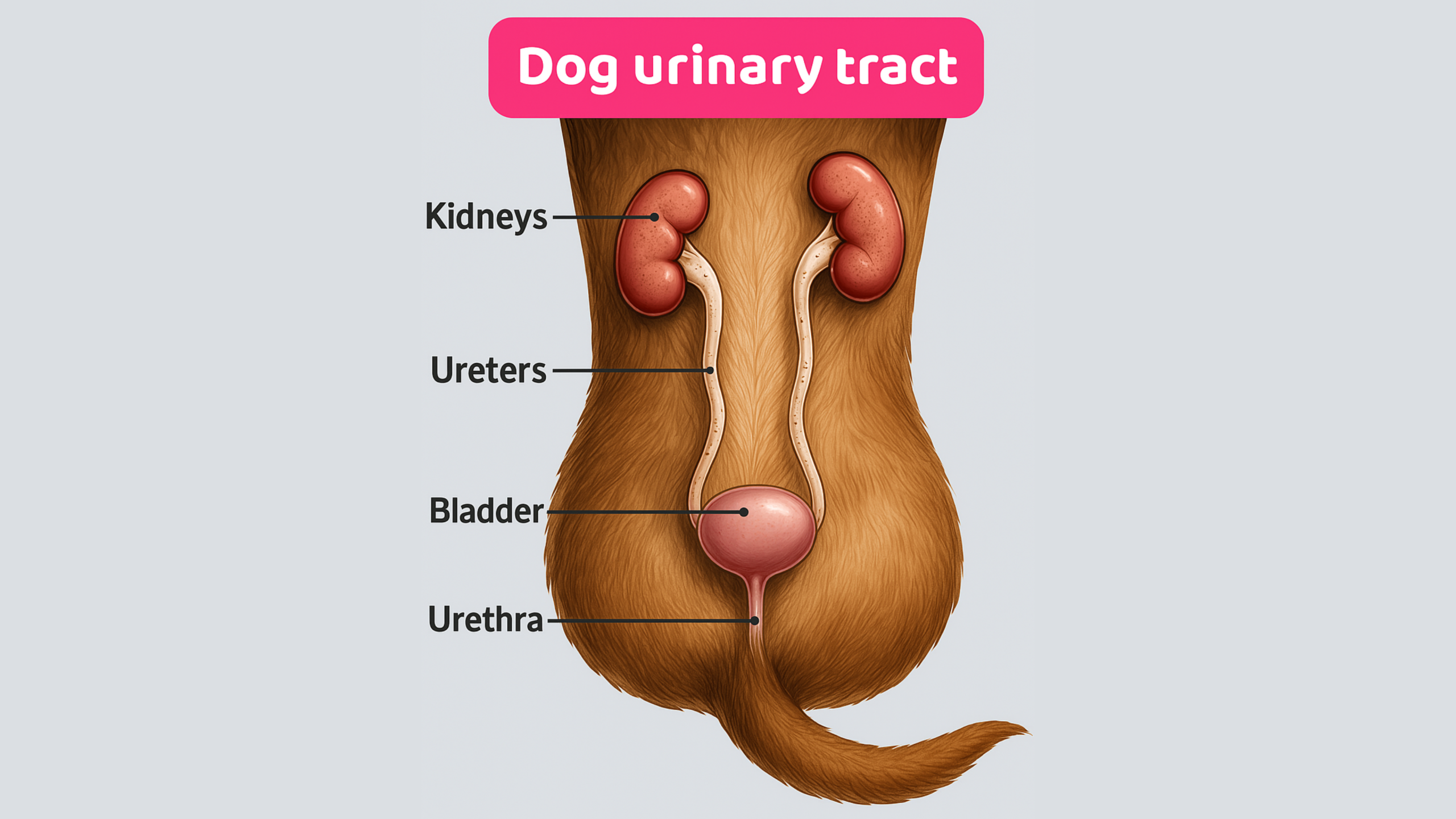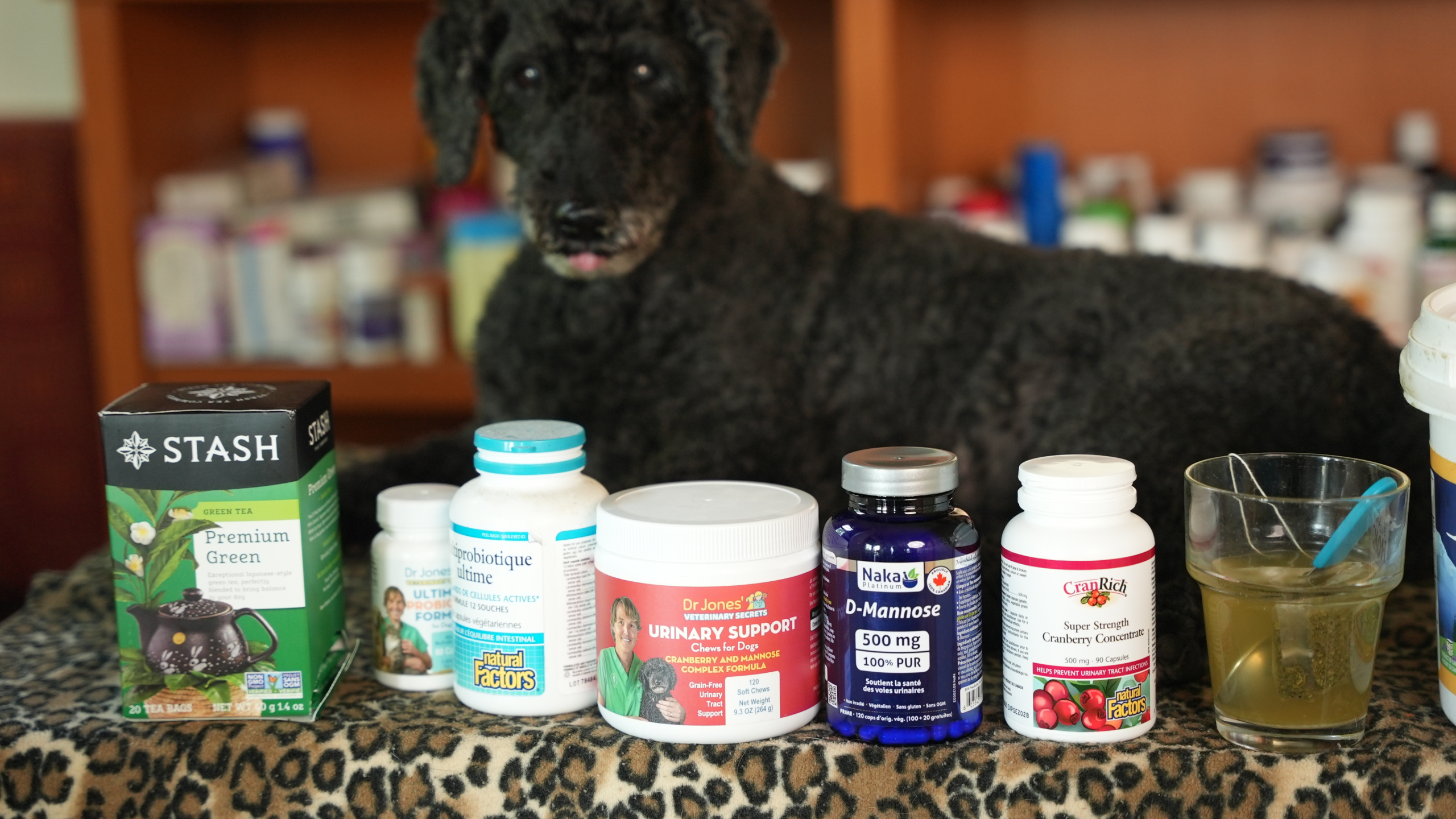How to Treat Dog UTIs at Home: Top 5 Home Remedies for Dog UTIs
![]()
Is your dog having trouble peeing? Frequent trips outside, straining to urinate, or blood in their urine could indicate a urinary tract infection (UTI). UTIs are more common in dogs than you might think, but the good news is, you don’t have to rely on medication alone. There are natural remedies that can help ease your dog’s discomfort and support their bladder health.
Want an extra boost for your dog’s urinary health?
Introducing Dr. Jones’ Urinary Support Chews for Dogs—a delicious, science-backed solution designed to keep your pup’s urinary tract and kidneys in top shape. Packed with nature’s best ingredients like cranberry, D-Mannose, organic marshmallow root, and more, these chews not only help prevent UTIs but also promote overall bladder comfort. Ideal for dogs of all sizes, these chews are a tasty way to keep your dog happy and healthy.


Recognizing the Signs of a UTI
First, let’s talk about the signs that could indicate your dog has a UTI. Some of the most common symptoms include:
-
Frequent urination, even in the house
-
Straining to urinate or showing signs of discomfort when doing so
-
A small amount of blood in their urine
-
Leaking or dripping urine
-
Licking at their genitals
-
Strong-smelling urine

My own dog, Lewis, once had a UTI when he was a pup. It was winter, and I noticed his urine had a red tinge when he went outside to relieve himself. This was my first sign that something was off. If you’re noticing these symptoms in your dog, it’s time to take action.
What Causes UTIs in Dogs?
UTIs are typically caused by bacteria that enter the urinary tract. The most common culprit is E. coli, which usually comes from fecal matter. Other bacteria like strep or staph can also be the offenders. In some cases, bacteria from your dog’s mouth (due to dental disease) or skin folds around their genitals can make their way into the urinary tract. Female dogs, especially those who are spayed, may also be more susceptible to UTIs due to a weakened bladder.
Whatever the cause, if you suspect your dog has a UTI, it’s essential to get them checked by a vet to confirm the diagnosis and rule out any more serious issues like bladder stones.
1. Honey: A Natural Antibacterial Remedy
When it comes to fighting bacteria, honey is a powerhouse. Its natural antibacterial properties make it a fantastic option for treating UTIs. Honey contains hydrogen peroxide and other compounds that inhibit bacterial growth. It’s also anti-inflammatory, helping to reduce the swelling and discomfort that often accompany UTIs.
Here’s how I use honey: For every 20 pounds of body weight, give your dog about 1 teaspoon of unpasteurized honey (though regular honey can still be beneficial). Administer this once or twice a day for 10 to 14 days. Your dog will likely enjoy the taste, and you’ll be helping to fight that UTI.
2. Green Tea: A Natural Antibacterial Powerhouse
Green tea contains a powerful compound called EGCg, which has been proven to be effective against bacteria like E. coli and staph. It also contains catechins, which act as natural anti-inflammatories, providing relief from bladder inflammation.
Don’t worry about the caffeine content— the amount in green tea is minimal and completely safe for your dog. Steep a cup of green tea, let it cool, and then mix in a tablespoon of honey for added antibacterial effects. For a dog weighing around 20 pounds, give them about a quarter cup of this mixture twice a day. This simple, soothing remedy can provide great relief.
3. Cranberry Extract: A UTI Fighter
Cranberries have long been associated with UTI prevention. They contain a compound called PACs (proanthocyanidins), which prevent bacteria from sticking to the walls of the bladder. While many people have used cranberry juice, I recommend using concentrated cranberry extract, which has a higher potency and is more effective for UTIs.
To use cranberry extract, you can give your dog 100 mg per 10 pounds of body weight daily. For a 20-pound dog, that would be about half a capsule. I like to sprinkle it on their food, and I’ve seen great results with dogs who suffer from recurrent UTIs. It’s safe for long-term use and can be a great addition to your dog’s diet.
4. D-Mannose: A Natural Sugar to Prevent UTIs
D-Mannose is a naturally occurring sugar found in fruits like apples, and it’s another effective remedy for UTIs. Studies have shown that D-Mannose works similarly to cranberry extract by preventing bacteria from adhering to the bladder wall, which is crucial in preventing UTIs.
For dogs, the dose is about 100-200 mg per 10 pounds of body weight daily. For a 20-pound dog, you would start with 200 mg twice a day for the first few days, then reduce to once a day. This remedy is gentle and free of side effects, making it a great long-term option for dogs with recurring UTIs.
5. Probiotics: Boosting Good Bacteria
Probiotics are not just for digestive health—they also play a crucial role in preventing UTIs. By introducing good bacteria into your dog’s system, probiotics help keep harmful bacteria like E. coli and staph in check. This is especially important for dogs with skin folds, as bacteria can easily accumulate there.
Using a high-quality multi-strain probiotic can make a huge difference, especially if your dog has recurrent UTIs. Probiotics can be given daily and are completely safe for long-term use. If you’re looking for an easy-to-administer option, Dr. Jones’ Ultimate Probiotic Formula for Dogs and Cats is a great choice.
Final Thoughts: Quick Action Is Key
UTIs in dogs can be uncomfortable, but they’re usually treatable with these natural remedies. If you see symptoms like frequent urination, straining, or blood in the urine, it’s time to act. While these remedies can provide relief, it’s always best to get your dog checked by a vet to rule out any more serious issues.
By using honey, green tea, cranberry extract, D-Mannose, and probiotics, you can help your dog recover from a UTI without resorting to antibiotics. If your dog’s UTI persists, don’t hesitate to seek professional care.
Thanks for reading, and I hope these remedies help your dog feel better soon!
Grab a Copy of Dr. Jones’ Pet Health Secrets Book

Want an extra boost for your dog’s urinary health?
Introducing Dr. Jones’ Urinary Support Chews for Dogs—a delicious, science-backed solution designed to keep your pup’s urinary tract and kidneys in top shape. Packed with nature’s best ingredients like cranberry, D-Mannose, organic marshmallow root, and more, these chews not only help prevent UTIs but also promote overall bladder comfort. Ideal for dogs of all sizes, these chews are a tasty way to keep your dog happy and healthy.








This is some great information on UTIs. I have a poodle and she weighs about 22 pounds. She is very picky and I have trouble getting her to try honey. I have heard I can give her Azo. To prevent another UTI. I have taken her to her vet and they took X-rays. She does have struvite bladder stones. Is there anyway for me to dissolve those? I have her on a diet of Hill’s Science Diet c/d that is supposed to be good for this type of stone. I worry about obstruction of her bladder and having to have surgery. I am wits end on what I can do to help. I feel I am at fault by feeding her to much high protein foods. Do you think this caused this? She is 2 1/2 years old and I did have her spayed at 8 mos. She reminds me of your Tula. Thank you. I am thinking about getting your Kidney chews and invest in CBD for pain if she has. Thanks again for all you do. I watch fairly often and believe in your advice.
Here’s what aligns with managing struvite bladder stones in your poodle (22?lb):
Yes, Hill’s c/d diet is appropriate—it’s formulated to dissolve struvite stones by lowering urine pH and reducing magnesium, phosphorus, and protein
Dissolution typically takes 4–12 weeks, and monthly X-rays or urinalysis are essential to track progress and prevent obstruction during shrinking stones
You must feed only the prescription diet, with no treats or other food—it can interfere with dissolving effectiveness
Increased water intake—add water to her meals or offer wet food—helps dilute urine and supports stone dissolution
Supplements like D?mannose, cranberry, probiotics, or DL?methionine may support urinary health and help prevent UTIs, but they cannot dissolve stones alone
If the diet isn’t working, or if obstruction risk becomes high, alternative options include urohydropropulsion, lithotripsy, or surgical removal (cystotomy)
Regarding causes:
Overfeeding high-protein diets can contribute because high protein, phosphorus, and magnesium promote struvite formation—but infections and urine pH are key drivers
Dogs Naturally
Considering kidney chews or CBD for pain:
They may help with comfort and inflammation, but they should not replace the prescription diet or antibiotics if a UTI is present.
Hello I have been trying to get some information on food , my 3 year old female pug has been on royal cannon urinarys/o for over a year and half cause she had struvite stones and a few uti’s , they did dissolve and we have been so far in the clear of no more uti’s I have been mixing her kibble with warm water and adding gently cooked performertrim food as a topper or making my own? After reading s watching your videos about prescription diets I like to get her off of this and put her on a good quality dry food and they continue to do the gently cooked or homemade toppers. Any suggestions for a good quality food I live in Canada your help would be greatly appreciated.
Good quality dry food + homemade or gently cooked toppers can be considered only after your vet confirms she is stable (no crystals, no UTIs) and you monitor urine regularly. Key diet goals for struvite prevention: ample hydration, control of urinary pH (slightly acidic), low-to-moderate levels of magnesium/phosphorus. If you switch, pick a high-quality commercial dry food that meets those criteria (or talk to your veterinarian about one) and ensure your homemade toppers don’t undo the urinary-health profile (i.e., avoid adding too many minerals or ingredients that raise urine pH or magnesium). Keep doing what you’re doing with the warm water + topper (that helps hydration). Adding hydration is strongly recommended. Continue monitoring (urine pH/USG, UTIs) and stay in touch with your vet.